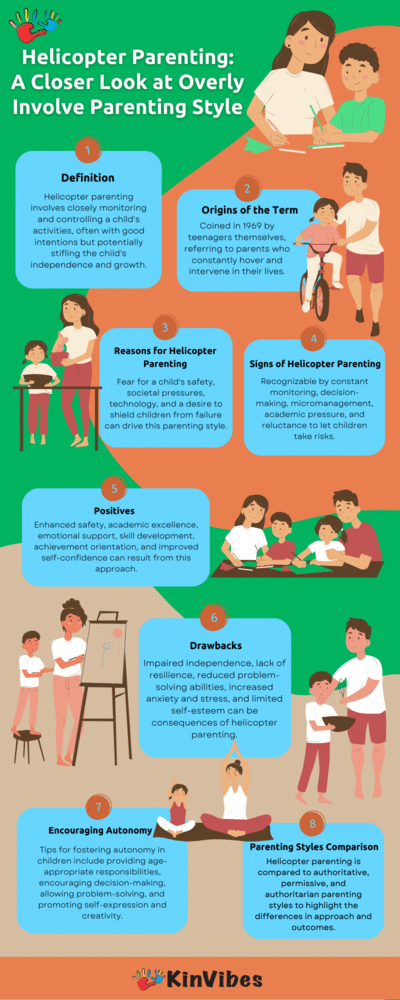The concept of “helicopter parenting” has gained significant attention over parenting again. This term refers to an exceedingly involved and overly protective parenting style, where parents closely monitor and control their children’s activities. This article will go into the effects, challenges, and potential consequences associated with this phenomenon.
DEFINITION OF HELICOPTER PARENTING

Helicopter parenting can be defined as an overly protective parenting style that involves closely monitoring and controlling a child’s every move.
This approach stems from a well-intentioned desire to ensure the child’s safety and success but can often result in an overbearing and suffocating environment for the child.
The term “helicopter” refers to the constant hovering and intervention of parents in their child’s activities and decision-making processes. Helicopter parents tend to micromanage their children’s daily lives, including academics, extracurricular activities, and social interactions, in an attempt to shield them from failure or harm.
This parenting style can positively and negatively affect the child’s development. On the positive side, it may lead to a more structured and disciplined upbringing, instilling a strong sense of responsibility and an achievement-oriented mindset in the child.
However, excessive parental control can also hinder the child’s independence, problem-solving skills, and self-confidence. It is important for parents to strike a balance between providing support and guidance while allowing their child the freedom to explore and learn from their own experiences.
ORIGINS OF THE TERM

The phrase “helicopter parent” has become a staple in modern parenting and family studies and discussions, but its roots trace back several decades. The term was first introduced to the world in the 1969 book “Parents & Teenagers” by Dr. Haim Ginott. In this groundbreaking work, Dr. Ginott delved into the intricate dynamics between parents and their adolescent children.
Interestingly, it wasn’t the parents or psychologists who coined this term but the teenagers themselves. They used “helicopter parent” as a metaphorical descriptor for their parents’ behavior, likening them to helicopters that hover constantly, always close by, and always vigilant. These parents, in the eyes of the teens, seemed to be omnipresent, always circling overhead, ready to swoop in at the first sign of trouble or to oversee even the minutest details of their lives.
This vivid imagery captured the essence of a parenting style that was characterized by excessive involvement and overprotectiveness. The term struck a chord and began to gain traction in popular culture, eventually becoming a widely recognized label.
Over the years, as societal norms and parenting philosophies evolved, discussions around helicopter parenting intensified, leading to both critiques and defenses of this approach.
The 1960s and 1970s were transformative years in developmental psychology in many ways, with shifts in societal values, the rise of youth culture, and changing dynamics in family structures. In this backdrop, Dr. Ginott’s identification of the “helicopter parent” phenomenon was timely. It highlighted a growing tension between the age-old parental instinct to protect and the burgeoning desire among young people for autonomy and independence.
While ‘Helicopter Parenting’ sheds light on one specific approach, it’s essential to understand the broader spectrum of parenting methods. Dive deeper into our comprehensive guide, ‘Find out which parenting style could be shaping your child’s future!‘ to gain a holistic view of the various influences on child development.
WHY DO PARENTS BECOME HELICOPTER PARENTS?

Research shows that parents adopt helicopter parenting habits for several reasons.
Firstly, parents may become helicopter parents because they fear their child’s safety and well-being. They want to protect their child from potential dangers and harm, often leading to excessive monitoring and control. Secondly, societal pressures and high expectations play a significant role in this parenting style.
Parents may feel compelled to ensure their child’s success and achievement, pushing them to hover over every aspect of their child’s life. Additionally, the rise of technology and social media has made it easier for parents to stay constantly connected and involved, further fueling helicopter parenting tendencies.
Moreover, parental anxiety and a desire to shield their children from failure or disappointment can also contribute to the development of helicopter parenting behaviors.
This type of parenting may stem from a genuine concern for their child’s well-being but can hinder their development of independence and resilience.
It is essential to balance parental involvement and allow children to navigate their own experiences.
In addressing this topic, it is important to consider the unique details surrounding the children of helicopter parents and parenting. These details can include the impact of helicopter parenting on the child’s sense of autonomy and decision-making abilities. It is crucial to explore the potential long-term effects of helicopter parenting, such as difficulties with problem-solving, lack of self-confidence and reduced motivation.
Understanding these details can help parents and society at large recognize the drawbacks of helicopter parenting and promote healthier parenting practices.
SIGNS OF HELICOPTER PARENTING

Overprotective parenting behaviors can be identified by certain signs. These signs include:
- Constantly hovering over children’s every move, monitoring and controlling their activities excessively.
- Being excessively involved in children’s lives, making decisions for them without giving them autonomy.
- Micromanaging children’s schedules and activities, leaving little room for them to make their own choices.
- Overemphasizing academic success and achievement puts excessive pressure on children to perform.
Additionally, parents who exhibit signs of overprotective parenting may also struggle to let their children take risks and make mistakes, hindering their development of independence and problem-solving skills.
Fact: Helicopter parenting, according to Dr. Michael Ungar, a family therapist and researcher, is that it can lead to negative outcomes for children, such as increased anxiety and reduced self-confidence.
POSITIVES OF HELICOPTER PARENTING
With a keen focus on a child’s wellbeing and success. This approach has several positive effects on children’s growth and development.
- Enhanced Safety and Security: Helicopter parenting ensures constant supervision and protection, minimizing the risks of accidents or harmful situations children may encounter.
- Academic Excellence: With an emphasis on academic achievement, helicopter parenting provides constant monitoring, guidance, and support, leading to better educational outcomes and higher grades.
- Emotional Support: Helicopter parents offer a nurturing environment, providing emotional support and readily addressing their child’s emotional needs, fostering a secure attachment and improved mental well-being.
- Skill Development: Through timely interventions and engagement, helicopter parents facilitate the development of essential life skills, such as decision-making, problem-solving, and time management.
- Achievement Orientation: The high expectations set by helicopter parents motivate children to strive for excellence, instilling a strong work ethic and fostering a drive for success.
- Improved Self-confidence: The close involvement and encouragement from helicopter parents boost children’s self-belief and self-confidence, enabling them to take on challenges and tackle obstacles with resilience.
Additionally, helicopter parenting promotes open communication, strengthens parent-child bonds, and contributes to the overall positive parent-child relationship. This approach ensures children have a strong foundation for future success and well-being.
Fact: According to the American Psychological Association, children raised in a helicopter parenting style exhibited higher levels of self-esteem and displayed greater academic performance compared to their peers.
POTENTIAL DRAWBACKS OF HELICOPTER PARENTING
Helicopter parenting, which refers to an overly over-involved parents and controlling approach to parenting, can have several potential drawbacks that need to be considered.
- Impaired independence: Constant hovering and excessive involvement by parents can hinder a child’s development of independence and decision-making skills. This can prevent them from developing important life skills necessary for adulthood.
- Lack of resilience: By constantly shielding their children from failure or disappointment, helicopter parents may inadvertently hinder their emotional resilience. These children may struggle to cope with challenges and setbacks later in life.
- Reduced problem-solving abilities: When parents overly manage every aspect of their child’s life, children may not have the opportunity to develop problem-solving skills. This can hinder their ability to navigate challenges and make independent decisions.
- Increased anxiety and stress: The high expectations and constant pressure placed on children by helicopter parents can lead to increased levels of anxiety and stress. This can have negative effects on their mental health and overall well-being.
- Limited self-esteem and confidence: helicopter parenting can have a detrimental impact on a child’s self-esteem and confidence. When parents constantly intervene and make decisions on behalf of their child, it can send a message that the child is not capable of handling situations on their own.
Furthermore, studies have shown that helicopter parenting can have long-term consequences for children as they grow into adulthood. It is important for parents to strike a balance between support and independence, allowing their children to develop essential life skills while involved parents also providing guidance.
In order to mitigate the potential drawbacks of helicopter parenting, it is advisable for parents to:
- Foster autonomy: Encourage your child to take on age-appropriate responsibilities and make decisions for themselves. Provide opportunities for them to learn from their mistakes and develop resilience.
- Encourage open communication: Create a safe and supportive environment where your child feels comfortable discussing their concerns and problems. This will help them develop problem-solving skills and build confidence in their abilities.
- Set realistic expectations: Avoid placing excessive pressure on your child to achieve certain goals or meet certain standards. Allow them to pursue their interests and passions at their own pace.
- Teach coping strategies: Help your child develop healthy coping mechanisms for dealing with stress and anxiety. Encourage activities such as exercise, mindfulness, and talking openly about emotions.
- Seek professional guidance if needed: If you find it challenging to strike a balance between involvement and independence, consider seeking the guidance of a parenting coach or therapist who can provide personalized strategies and support.
By adopting these approaches, parents can promote healthy development and help their children thrive while mitigating the potential risks associated with helicopter parenting.
For a comprehensive guide on achieving parenting equilibrium, don’t miss our article on ‘How to Master the Art of Balancing Love and Rules as a Parent.‘
ENCOURAGING AUTONOMY IN CHILDREN

Encouraging Autonomy in Children is essential for their development. It allows them to develop important life skills and become independent individuals. Here are four points to consider:
– Providing age-appropriate responsibilities and tasks allows children to learn and grow.
– Encouraging decision-making empowers children to make choices and learn from the consequences.
– Allowing children to solve problems on their own fosters critical thinking and problem-solving skills.
– Promoting self-expression and creativity helps children develop their unique personalities.
When encouraging autonomy in children, it is important to provide guidance and support without overstepping boundaries. By doing so, children can develop a sense of self-worth and confidence in their abilities.
It is worth mentioning that every child is unique, with different needs and personalities. Therefore, tailored approaches to autonomy promotion may be necessary.
In a true story, a parent encouraged autonomy in their child by involving them in decision-making from an early age. This allowed other parents and the child to develop strong decision-making skills and a sense of responsibility. As a result, they grew into an independent and confident individual.
PARENTING STYLES

Parenting is complex, and over the years, psychologists and educators have identified several distinct styles that parents tend to adopt. Each style has its unique characteristics, advantages, and challenges. Let’s explore how the helicopter mom parenting compares to some of the most recognized parenting styles.
| Parenting Style | Key Characteristics | Primary Focus |
|---|---|---|
| Helicopter | Overprotective, very involved, micromanages child’s activities | Child’s safety and success |
| Authoritative | Balanced, sets clear rules, encourages open communication | Child’s autonomy within boundaries |
| Permissive | Few rules, laid-back, highly responsive | Child’s freedom and expression |
| Authoritarian | Strict, demands obedience, values discipline | Conformity and obedience |
Helicopter Parenting Vs. Authoritative Parenting
Authoritative parents strike a balance between setting boundaries and granting autonomy to adult children. They establish clear rules and expectations but also encourage open communication and provide warmth and support. Unlike helicopter parents, authoritative parents allow their children to face challenges and learn from their mistakes, fostering resilience and problem-solving skills.
Helicopter Parenting Vs. Permissive Parenting
Permissive parents tend to set few rules and boundaries, often adopting a more laid-back approach. While they are loving and responsive, they might not provide the structure and guidance that children sometimes need. Unlike helicopter parents, permissive parents rarely intervene, even when it might be beneficial for the child.
Helicopter Parenting Vs. Authoritarian Parenting
Authoritarian parents are strict and demand obedience. They value discipline over open communication, often employing a “because I said so” approach. While they might share the over-involvement trait with helicopter parents, their motivations and methods differ. Authoritarian parents prioritize obedience and conformity, whereas helicopter parents prioritize safety and success.
FIVE FACTS ABOUT HELICOPTER PARENTING:
- Helicopter parenting refers to an overprotective parenting style.
- Helicopter parents tend to involve themselves in all aspects of their children’s lives, sometimes to the detriment of the kids.
- Helicopter parents often micromanage their children’s schedules and intervene frequently to make things smoother for their children.
- Helicopter parenting can stem from a desire to give children a childhood unlike what the parents experienced or from social pressure to succeed.
- While helicopter parenting can provide support and guidance, it may hinder children’s autonomy and ability to handle challenges independently.
FAQS ABOUT HELICOPTER PARENTING
What Is Helicopter Parenting?
Helicopter parenting refers to an overprotective and very involved parenting style. These parents tend to involve themselves in all aspects of their children’s lives, sometimes to the detriment of the kids.
Why Do Parents Become Helicopter Parents?
Parents may become helicopter parents due to a desire to give their children a better childhood than what they experienced, social pressure to succeed as a parent and for their kids to succeed in elementary school, or a need to feel needed and protect their children from harm.
What Are The Potential Drawbacks Of Helicopter Parenting?
While helicopter parenting can have some positive aspects, it could potentially be problematic for children in the long run. It may lead to a lack of independence, low self-esteem, poor coping skills, and difficulties in developing problem-solving abilities.
How Can Parents Encourage Autonomy While Still Keeping Their Children Safe?
Parents can encourage autonomy by allowing their children age-appropriate activities, gradually increasing their responsibilities, promoting independence, and teaching them problem-solving and decision-making skills.
What Are The Effects Of Helicopter Parenting On Children’s Mental Health?
Research suggests that helicopter parenting can negatively affect children’s mental health, such as increased anxiety, depression, and decreased self-confidence. It may also inhibit their ability to develop resilience and navigate challenges independently.
What Are Some Alternative Parenting Styles To Helicopter Parenting?
Various parenting styles differ from helicopter parenting, such as authoritative parenting (firm but supportive), permissive parenting (lax rules and high warmth), and uninvolved parenting (low involvement and responsiveness). Each style has its own strengths and limitations.
WRAPPING UP HELICOPTER PARENTING
In analyzing the concept of helicopter parenting, it is evident that this overly involved parenting style can have both positive and negative effects on children’s experiences. While it may initially seem like a way to protect and support children, it can ultimately hinder their independence and personal growth. Research has shown that children raised by helicopter parents may struggle with decision-making, problem-solving, and self-confidence.
However, it is important to push parents to acknowledge that every child and family dynamic is unique, and there may be instances where helicopter parenting is beneficial. It is crucial for parents to find a balance between involvement and allowing their children to develop their own skills and resilience.
By fostering a supportive environment and gradually increasing independence, parents can help their children thrive and become self-sufficient individuals.






